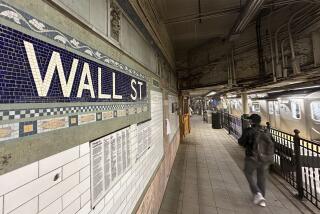Stock market closes mostly lower
Concerns over weaker global economic growth appeared to outweigh a pair of strong reports on the U.S. economy Tuesday, nudging stocks to a tiny loss.
Crude oil prices sank 3 percent, pulling down stocks of oil producers. Small-companies, which have fewer ties to the world economy, made gains. Meanwhile, the dollar reached a one-year high against the euro as short-term interest rates edged up.
“It’s the picture of U.S. strength against the backdrop of global weakness,” said Jack Ablin, chief investment officer at BMO Private Bank in Chicago.
The S&P 500 index slipped 1.09 point, less than 0.1 percent, to 2,002.28. The Dow Jones industrial average fell 30.89 points, or 0.2 percent, to 17,067.56.
Market gauges that give greater weight to smaller companies fared better. The Nasdaq rose 17.92 points, or 0.4 percent, to 4,598.19.
Two reports out Tuesday offered encouraging signs of U.S. economic growth. The Institute for Supply Management, a trade group, said its gauge of manufacturing reached 59 in August, the highest level since March 2011, buoyed by new orders for goods and increased production. Separately, the Commerce Department said that construction spending surged 1.8 percent in July, the biggest increase in more than 2 years.
“It’s clear we have a very solid economic expansion, but the stock market isn’t buzzing much at all,” said Anastasia Amoroso, Global Market Strategist at J.P. Morgan Funds. The explanation, she said, is that signs of solid growth raise the odds that the Federal Reserve will move to lift short-term interest rates. Rate increases typically slow stock markets down.
“We’re moving closer and closer to higher rates,” Amoroso said, “so strong economic momentum could actually put a damper on the market.”
A handful of key events and economic reports out later in the week could make for volatile trading.
The European Central Bank meets Thursday, and the U.S. employment report for August comes out Friday. Stronger hiring by U.S. businesses and rising corporate profits have helped push the S&P 500 index up 8 percent this year.
Ablin said a stock market drop caused by the Fed hiking rates wouldn’t exactly be a bad thing. Waiting too long could make the pain much worse. “I would rather take a spoonful of medicine today than a tourniquet later.”
Major markets across Europe were mixed. Germany’s DAX inched up 0.3 percent, and both the CAC-40 in France and Britain’s FTSE 100 ended flat.
The euro continued its summer slide, hitting $1.313 against the U.S. currency. Recent economic reports have shown the eurozone’s economy slowing to a crawl, and that has weighed on the euro.
The price of oil slumped, pulling down shares of oil and gas companies. Benchmark U.S. crude dropped $3.08 to close at $92.88 a barrel, its lowest price since January. Brent crude, a benchmark for international oils used by many U.S. refineries, fell $2.45 to end at $100.34. That was Brent’s lowest closing price since May of 2013.
News that Norwegian Cruise Line agreed to buy Prestige Cruises International for $3 billion sent Norwegian Cruise Line’s stock up 11 percent. Analysts said the deal should help Norwegian compete with its larger rivals: Carnival Corp. and Royal Caribbean Cruises. Norwegian Cruise Line jumped $3.68 to $36.99.
Exelixis lost more than half its value following news that the drug developer’s potential treatment for prostate cancer fell short in late-stage research. The company’s stock plunged $2.29, or 55 percent, to $1.85.
U.S. government bond prices dropped, lifting long-term interest rates. The yield on the 10-year note rose to 2.41 percent, up from 2.35 percent late Friday.
In metals trading, gold fell $22.40, or 1.7 percent, to $1,265 an ounce. Silver slipped 34 cents, also 1.7 percent, to $19.152 an ounce. Copper was flat at $3.155 a pound.
More to Read
Inside the business of entertainment
The Wide Shot brings you news, analysis and insights on everything from streaming wars to production — and what it all means for the future.
You may occasionally receive promotional content from the Los Angeles Times.








